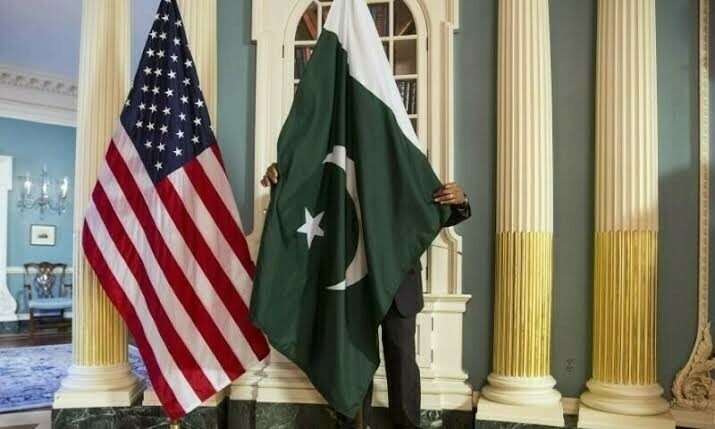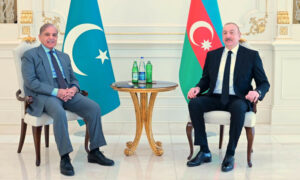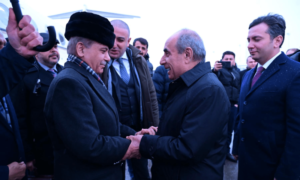Pakistani institutions, such as ECP, have benefitted from Washington’s support in the past.
• Pakistani institutions, such as ECP, have benefited from Washington’s support in the past
• Waiver granted for oversight of F-16 programme
THE Trump administration has halted nearly all US government funding for programmes that promote democracy and human rights in many countries, a move that experts warn will have significant repercussions for Pakistan’s democratic institutions.
Pakistan has been one of the largest recipients of US development assistance in South Asia. Under these programmes, Washington provided between $13 million and $15 million to the Election Commission of Pakistan (ECP) to support free and fair elections.
The funds were allocated for the ‘Strengthening Electoral and Legislative Processes’ project, which ran from 2016 to 2023, under the supervision of the United Nations Development Programme (UNDP).
The Trump administration’s broader foreign aid freeze has also impacted humanitarian and development assistance, halting $845m in funding for Pakistani projects and disrupting 11 governance programmes.
In a recent interview with a Fox News affiliate in Detroit, Michigan, former Pakistani president Arif Alvi claimed that the US Agency for International Development (USAID) had given up to $17m to the ECP.
Supporting the Trump administration’s decision to suspend such funding, Dr Alvi asserted that the ECP was responsible for overseeing the 2024 general elections, which he alleged were marred by widespread rigging.
However, according to data from the US government website ForeignAssistance.gov, Pakistan received between $13m and $15m for the seven-year programme, and not specifically for the 2024 elections.
Waivers
However, a number of waivers have been issued as well. Pakistan is receiving two types of waivers under the Trump administration’s new aid policy: emergency humanitarian assistance and security-related funds.
Under a national security waiver, $397 million has been allocated to a US-backed programme monitoring Islamabad’s use of F-16 fighter jets. A congressional aide emphasised that such oversight serves US national security interests, given Pakistan’s nuclear capabilities.
Additionally, the US Bureau of International Security and Nonproliferation has secured 17 exemptions aimed at curbing the spread of weapons of mass destruction.
Pakistan also qualifies for emergency humanitarian aid, including food and medical assistance for flood-affected areas, though the total amount remains undisclosed.
Consequences for Pakistani institutions
The sudden loss of US funding raises concerns about Pakistan’s ability to maintain electoral transparency and civil society engagement. The cut in democracy assistance means that the ECP will have fewer resources for election monitoring and capacity-building programmes.
Civil society organisations that rely on US support for voter education and legal reform will also struggle to continue operations. Media and watchdog groups that play a crucial role in ensuring fair elections may lose funding, limiting their ability to hold institutions accountable.
A senior official at a leading Pakistani think tank, speaking on condition of anonymity, described the situation as “a major setback for democracy advocates in Pakistan. The US was a key partner in ensuring transparency, and this decision leaves a vacuum that authoritarian forces could exploit”.
Global impact
Pakistan is not the only country affected. The National Endowment for Democracy (NED), which funds civil society groups worldwide, reported that it could no longer access its accounts at the Treasury Department.
The shutdown came after staff from Elon Musk’s newly created Department of Government Efficiency (DOGE) took control of financial operations.
Mr Musk has publicly criticised NED, calling it “a scam” and “an evil organisation”, a sentiment echoed by conservative think tanks such as the Centre for Renewing America, which argues that the entity interferes in other countries’ internal affairs.
The cuts are extensive: $486m slashed for global electoral and political process strengthening programmes; $39m removed from fiscal federalism projects in Nepal; and $47 million cut from educational programmes across Asia.
In India, President Trump questioned why the US was funding election-related initiatives in a “wealthy nation”, leading to the cancellation of a $21m grant.
Indian ruling party leader Amit Malviya labelled the now-cancelled funding as “external interference in India’s electoral process”.
Expert warnings
Michael Kugelman, director of the Wilson Centre’s South Asia Institute, emphasised the long-term damage these cuts could inflict: “Pakistan is one of the largest recipients of US development assistance in South Asia. These cuts will not only impact electoral support but will also affect civil society organisations that promote democratic governance.”
Congressman Steve Cohen, a Democrat from Memphis, called the aid reductions “a serious blow to the US government’s role in international development, halting critical humanitarian aid, disaster relief and global health initiatives”.
The International Council of Voluntary Agencies (ICVA), a network of groups in about 160 countries, warned that US cuts had taken a devastating toll on crisis-hit populations. In a recent report, ICVA noted that aid groups across the world have been forced to close operations, lay off staff and halt life-saving work.
While the Trump administration argues that these cuts align with an “America First” policy, critics contend that reducing US engagement in democratic development will embolden authoritarian regimes and weaken global governance.
As debates continue in Washington, affected countries must reassess how to sustain democratic initiatives without US support.
Published in Dawn, February 24th, 2025
- Desk Reporthttps://foresightmags.com/author/admin/










